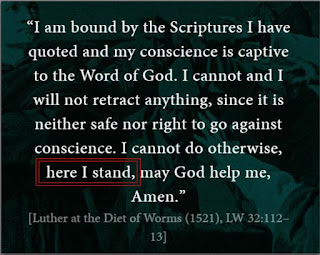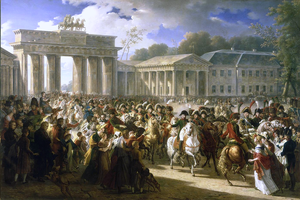 |
| K&D Commentary on OT |
Who was Franz Delitzsch? … why is he a famous German theologian, even today? One indication is that many of his German writings were translated into English – mostly by Scottish (Reformed) Church people (T & T Clark). These works are actively sold today by Reformed book distributors. At right is the 10 volume series Keil & Delitzsch Commentary on the Old Testament, sold for the amazing CBD price of $99! (That's $10/volume. Hmmm... maybe CPH should figure out how to sell Luther's Works at such a ridiculously low price so more people could read Luther!) More can be read about Franz Delitzsch at both the English and especially the German Wikipedia sites. But what you will not find at practically all other sites is what Franz Pieper reports of both the early Franz Delitzsch, and the fall of the later Franz Delitzsch.
One could think of Delitzsch as the ultimate expert on Biblical Hebrew language. He most certainly was an expert! But we see from the writings of the old (German) Missouri Synod that he was not the ultimate Biblical Hebrew scholar. No, that remains for the likes of… Martin Luther, and the teachers of the old Concordia Seminary, St. Louis, Missouri. An example of their strength and Delitzsch's weakness is displayed especially in comments on Genesis 4:1 (note Prof. Eduard Pardieck). — Now I present Part 3 of my translation:
Translation by BackToLuther; all green shaded text was omitted in the 1950 English edition and is first published here in English; all underlined words emphasized in the original German; red text and/or red bold text is my emphasis, all notes inside square brackets [ ] are mine; many items hyperlinked for reference; hyperlinked page numbers in square brackets [ ]; all unshaded text was included in English edition but re-translated to avoid copyright complaint by CPH.
He [Delitzsch] says of the Holy Scripture [pg 6-7]: “It alone is the foundation upon which the Christian Church defies the gates of hell, the touchstone according to which it distinguishes between truth and falsehood, according to which it is judged, but also by which it is judged. To this Word it [the Church] must submit itself with reverence, with humility, with self-denial. It is not placed as a judge, but as a housekeeper, from whom God will demand accountability; if it does not want to invite the curse of God, it should neither add to nor take away anything from this Word; without any fear or favor of men, it should confess its faith in this Word and defend it from all injustice or heretical doctrine, according to the express command of God.” Through disregard of Scripture, Rome has fallen. [pg 8:] “The fathers of our Lutheran Church, however, did not fight anti-Christianism with anti-Christianism, they did not place a source of knowledge, such as tradition, alongside or even over the Holy Scripture. They did not substitute for the long-running darkness the natural light of human reason, nor the supernatural of an immediate enlightenment, but the light of the Holy Scripture, without which human reason, whether philosophizing or swarming over it, remains forever blind and unenlightened. Of course, you [neologists] separate between the letter and spirit. [pgs 20-21:] You flatter yourselves that Luther is your patron. But never does Luther understand by the Word of God anything other than the letter of the Holy Scriptures, never the inspiration of an inner light, the ideas of blind reason, or the illusions of perverted feelings, but always the written Word according to the simple Word excluding of all human mediation, falsification and spiritualization — the Holy Scripture, by which alone, but by which also always God the Holy Spirit works, they become to the listener or reader a smell of life to life or a smell of death to death.” [2 Cor. 2:16]
- - - - - - - continued in next Part 4 - - - - - - - - -
Could it be that the Church History taught by Prof. Erik Herrmann does not follow the early Delitzsch but rather the later Delitzsch, the later Delitzsch who fell to “scientific theology”? Prof. Herrmann, chairman of the historical theology department at Concordia Seminary, St. Louis, follows Prof. (emeritus) Robert Kolb as director of the Center for Reformation Research and is a staunch defender of the teaching of Prof. Jeffery Kloha (the Bible is a “plastic text”). Hmmm... seems like an easy question to judge... what do you think, dear reader?... especially in light of what our Saviour says –
The Scripture cannot be broken. — John 10:35To you, Profs. Herrmann and Kloha, I shall use the words of the early Delitzsch:
“You flatter yourselves that Luther is your patron.” – Franz Delitzsch
Nay, more than these, I say to all the teachers and leaders of today's LC-MS:
“You flatter yourselves that Luther is your patron.” – Franz Delitzsch
 |
| lutheranreformation.org |
Today's LC-MS proposes to be at the forefront of the celebration of the 2017 500th anniversary of the Reformation. On their new website lutheranreformation.org they have emblazoned the quote from Luther shown at the right: ==>>
One could take heart that they at least quoted this defining statement of the Reformation and even included the disputed portion "Here I Stand". But that rings hollow when its teachers call these very same Scriptures... “plastic text”. Now some will protest that Prof. Kloha has retracted these words, but Kloha has not retracted his teaching that effectively says “The Bible is a book of PLASTIC TEXT!” Delitzsch's words above ring out against Kloha and Herrmann:
Nay, to more than the teachers and leaders identified above... to anyone in the LC-MS who does not reject the erroneous teaching of Prof. Kloha (and so also of his defender Prof. Herrmann) but yet fancies themselves followers of the Reformer of the Church, I apply Delitzch's statement:“To this Word it must submit itself with reverence, with humility, with self-denial. It is not placed as a judge, but as a housekeeper, from whom God will demand accountability”.Today's LC-MS teachers are placing knowledge of “variant readings” over Holy Scripture and so doing what the early Delitzsch charged Germany's theologians of doing: fighting anti-Christianism with anti-Christianism.
“You flatter yourselves that Luther is your patron.” – Franz DelitzschHow is that for an introduction to the so-called Reformation 500 “celebration” of the LC-MS...
the Lutheran Church-“Missouri Synod”, “Missouri Synod” so-called?
In the next Part 4, Delitzsch addresses the Lutheran Confessions and the “old dogmaticians” of the Lutheran Church.



